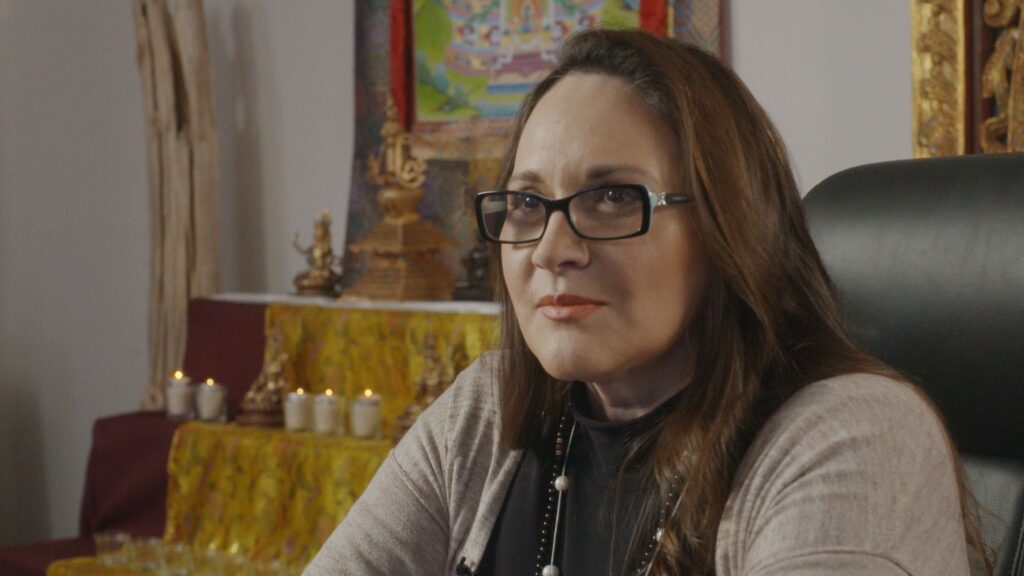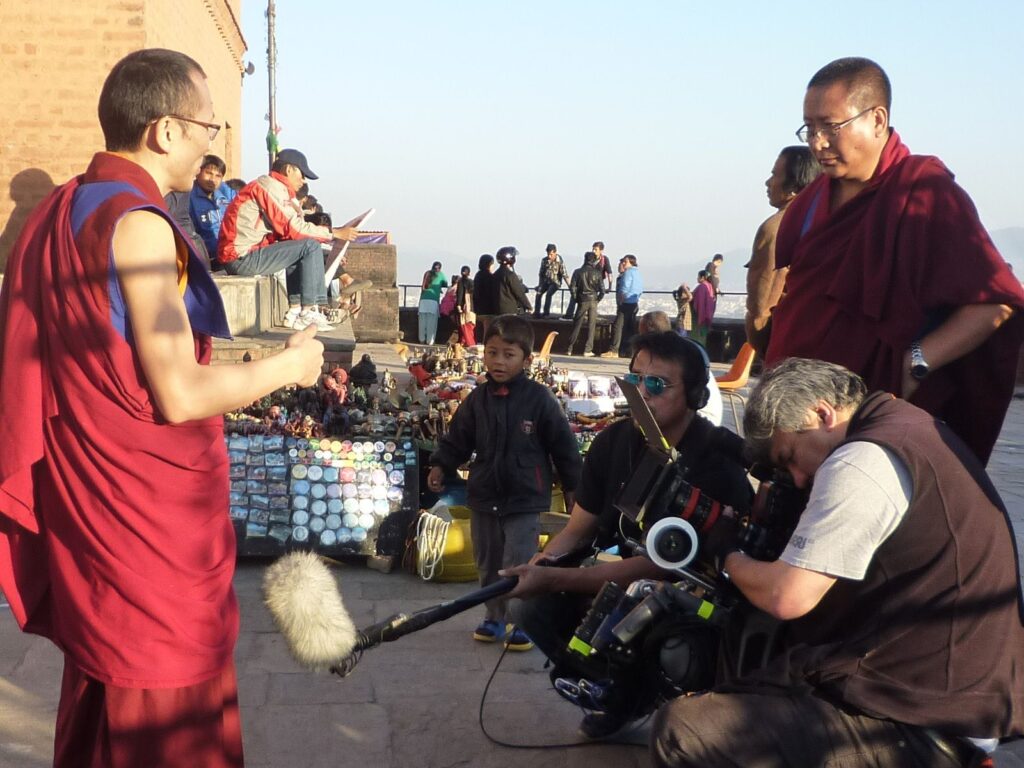A simple phone call can change your life, says Georgina Teran

The documentary about Yongdzin Tenzin Namdak Rinpoche, the most senior and venerated living master in theYungdrung Bon tradition, is completed now, right for the celebration of his 100th birthday starting in a couple of days. In this interview, taken by Alexandra Forget, Georgina Teran, the producer of the documentary, talks about the motivations behind the huge project and about her connection to Yundgrung Bon. The interview was held in 2018 but was reviewed by Georgina and Alexandra just before being published in Speech of Delight.
Georgina, you’re a very successful film producer from Mexico with business activities in the US, Columbia and in Spain. Spirituality was never a priority for you. What brought Yungdrung Bon into your life?
My ex-colleague Rosa Maria, with whom I had studied at university, called me very unexpectedly one day after almost two decades of no contact. She told me that she had just finished a 49 days dark retreat in a monastery. (It was Triten Norbutse monastery in Nepal.) She explained that while she was in the dark retreat, she had a vision that I was going to help monks of the monastery with a documentary about their master.
Not knowing any of these particular practices, didn’t you think your friend was a little mad, spending all this time in the dark and speaking about visions?
Well, solitary confinement is used as a punishment for really rebellious prisoners, and often, results in the prisoners suffering from panic attacks and hallucinations. So, I thought this practice needed to be very potent spiritually if it gave her the tools necessary to handle such a long period confined alone and in the dark without suffering. I was actually quite intrigued. Then, she sent me a photo of her master Yongdzin Rinpoche. He made a very strong impression on me instantly. I would be working, only to stop and reopen the picture Rosa Maria sent just to see him. I would close it and go back to work, only to repeat the process over and over again. Thus, when she urged me to come to the summer retreat in Shenten in 2013, I decided to go.
What was your impression when you first met Rinpoche?
Rinpoche told me how important devotion was and I felt a strong sense of longing, when I saw all the practitioners doing prostrations in the Gompa and later chanting the Guru Yoga prayer. However, listening to Yongdzin Rinpoche’s teachings later on during the retreat, it seemed to me that Rinpoche was answering questions I had asked myself throughout my whole life and that really astonished and moved me.
What kind of questions?
Why can’t people be happy? Why are we as humans constantly unsatisfied? Why is there so much discontent and violence in the world, which no political, religious or social institution seems to be able to solve? Who are the good guys on this planet?
Those good guys you see in the movies that really care about others.
Fundamental questions about life which are also the very foundation of the Dharma : « How to find true and lasting happiness and be free from suffering?»
Yes, indeed. And with that visit I realized that I had finally found « the good guys », those who commit their lives to grow their spiritual knowledge and wisdom to help others.
Yet a documentary about a spiritual master is not the kind of film you usually make. It must have been quite a challenge.
It has been. When Rosa Maria introduced me to Geshe Gelek Jinpa, he told me that they had been looking for someone to do the documentary for quite a while and what an exceptional and important master Rinpoche was. Khenpo Tenpa Yungdrung Rinpoche, the abbot of Triten Norbutse monastery, was writing the script, but when I looked at it, it seemed very complicated to me, there were a lot of names and locations I didn’t know anything about. Then, there was also the language barrier. Many of the people we were going to interview only spoke Tibetan, Nepali or Hindi. Another problem we thought we were going to have was the difficulty for us and the crew to get access to the monasteries.

How did you solve these problems?
I agreed to make the film under one condition: the team had to be made up of monks and we, the professional crew would follow and film their journey. So we could be sure that the spiritual knowledge and traditions were going to be treated with care and respect. Once Khenpo Tenpa and Geshe Gelek had informed the council members about the project and they agreed it should be done, all the monks and Geshes of Triten Norbutse monastery gave their unconditional support, and so we could go ahead and do it. We invited the crew of monks for specialized training in Mexico. They all learned very fast. The work was complex and intense, but they all seemed to enjoy it a lot, because they were doing it for their master.

On top of that, they were discovering different countries and cultures throughout the course of the documentary and must have gained a lot of interesting experiences?
We traveled to India, Nepal, Dolpo, Mustang, Tibet and many European countries. Geshe Gelek also travelled to Spain and Colombia. In Colombia, we presented the Teaser of the documentary to the film industry. During our stay, we got an unexpected visit from a Colombian producer accompanied by an indigenous princess from the local Muisca tribe. They had heard about our presence and wanted to meet Tibetan monks. They just came to my door and rang the bell.
The princess told us about a very old and famous prophecy which exists all throughout the American continent, from North all the way down to South America. It says, that one day, when the eagle and the condor fly once again together in the sky, the world will find balance. One of the elders expressed that female energy has a very important role in the return of the spirituality.
What happened next?
They invited us to an important gathering in the mountains of various indigenous tribes who came from all over the American continent in order to discuss matters of that prophecy. They were very happy to meet Geshe Gelek. They told him that it was time for the big mountain of Tibet to reconnect with the big mountain of America. Some of the leaders of these indigenous tribes also attended the presentation Geshe Gelek gave the film industry, in which he spoke about meditation and spiritual wisdom. It was too short, of course, but they wished to learn more in the future.

You might have heard about a prophecy atributed to Padmasambhava, known as Guru Rinpoche, who lived in Tibet in the 8th century, which says something like: «When the iron bird flies and horses run on wheels, the Tibetan people will be scattered like ants across the world and the Dharma will come to the land of the red faced man». So it looks there are similar prophecies on both sides.
Indeed.
When do you plan to release the film?
We don´t know. There are a lot of factors that impact the release, but we are doing everything we can to give it the best distribution possible. However, a lot of that process is out of our hands. I would be deeply happy if this documentary of H.E.Yongdzin Tenzin Namdak Rinpoche’s life could touch the hearts of many people, touch and inspire and benefit them and maybe, even change their lives, just as it has changed mine.
Georgina, I thank you very much for this interview and wish you and all your team a lot of success for the release of this documentary which our sangha is very impatient to see.
Thank you!!!
Pictures: courtesy of Georgina Teran






